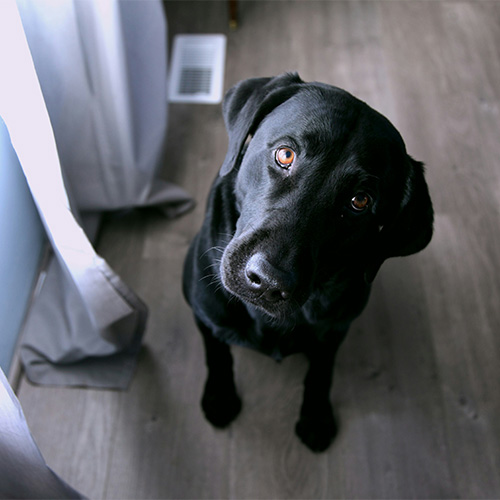


THE HOUND HUB
Stopping "accidents" in the home
Help & Advice
16 April 2024
Defecating indoors is an unacceptable behaviour for dogs due to various reasons that impact both the dog and its owner.
Firstly, indoor defecation creates unsanitary conditions within the household, posing health risks for both humans and pets. Faeces contain bacteria, parasites, and pathogens that can spread disease and cause illness if not promptly cleaned and disposed of properly. Exposure to faecal matter can lead to gastrointestinal infections, respiratory issues, or skin irritations, particularly in young children or individuals with compromised immune systems. Moreover, the odour and mess associated with indoor defecation can be unpleasant and disruptive to the household environment, leading to discomfort, stress, and dissatisfaction among occupants.
Additionally, indoor defecation undermines the basic principles of house training and hygiene that are essential for responsible pet ownership. Housebreaking is a fundamental aspect of dog ownership, teaching dogs to relieve themselves in appropriate outdoor locations. Failure to adhere to housebreaking protocols can result in confusion, frustration, and regression in training progress. It also creates extra work and inconvenience for owners who must clean up after their pets and may lead to strained relationships between owners and their dogs.
Furthermore, indoor defecation can be indicative of underlying behavioural or medical issues that require attention and intervention. Dogs may defecate indoors due to anxiety, fear, territorial marking, or physical discomfort such as gastrointestinal distress or urinary tract infections. Ignoring or dismissing indoor defecation as a mere nuisance overlooks the potential significance of the behaviour and may result in worsening health or behavioural problems for the dog. Proper evaluation by a veterinarian or animal behaviourist is necessary to identify and address any underlying issues contributing to indoor defecation.
Indoor defecation also poses challenges for the socialization and integration of dogs into various environments. Dogs that defecate indoors may be perceived as poorly trained or poorly behaved, leading to embarrassment or frustration for owners and limiting opportunities for social interaction and engagement with others. Moreover, indoor defecation can damage the trust and bond between owners and their dogs, eroding the mutual respect and understanding essential for a harmonious relationship.
Addressing indoor defecation requires a multifaceted approach that encompasses proper training, management, and veterinary care. Establishing a consistent routine for outdoor bathroom breaks, rewarding desired behaviour with praise and treats, and closely supervising the dog indoors can help prevent accidents and reinforce appropriate elimination habits. Additionally, providing adequate physical exercise, mental stimulation, and opportunities for outdoor exploration can reduce stress and anxiety, contributing to better bladder and bowel control. In cases where medical or behavioural issues are suspected, seeking professional guidance and intervention is crucial to address the underlying causes of indoor defecation effectively.
In conclusion, indoor defecation by a dog is unacceptable behaviour due to its implications for hygiene, housebreaking, health, and the owner-dog relationship. By understanding the reasons behind indoor defecation and implementing appropriate strategies to address the behaviour, owners can create a clean, safe, and harmonious environment for themselves and their dogs.

For more information on how we can help, please contact us using the form below:
For more information on how we can help, please contact us using the form below:
